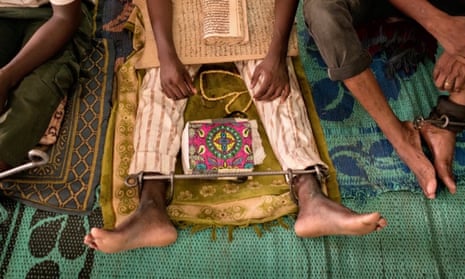Nigeria has been urged to end all forms of abuse in state-run mental health institutions as well as religious healing centres.
In a report published on Monday Human Rights Watch (HRW) said thousands of Nigerians with mental health conditions face prolonged detention, chaining, physical and sexual violence or forced treatment, including electroshock therapy.
The campaigning group said mistreatment is “rife” in both Christian and Islamic faith healing centres and state hospitals and rehabilitation centres. This is despite the recent closure of several facilities and a condemnation of abusive facilities from President Muhammadu Buhari’s office.
Last week, an Islamic rehabilitation centre with 259 patients in the southwestern city of Ibadan was shut down and its owner arrested. Buhari’s office said in a statement in October that Nigeria would not “tolerate the existence of the torture chambers and physical abuses of inmates in the name of rehabilitation.”
But HRW’s report shows that such interventions have fallen short of addressing a problem that is widespread across Nigeria. Stigma and misconceptions, including beliefs that mental health conditions are caused by evil spirits or demons, mean that patients are often detained, abused and forced to “sleep, eat and defecate within the same confined space”, often in front of others, HRW said.
There are less than 300 psychiatrists in a population of over 200 million, most of whom cannot afford mental health care. This drives many to traditional religious healing centres, where prayer and herbal treatments are prescribed.
“People spend years in institutions – sometimes decades – because Nigeria lacks adequate services to support them in the community,” according to the report.
Patients in some Christian facilities, HRW said, are forced to fast for up to three days as a form of religious treatment. Some Islamic centres are found to have employed whipping.
HRW said it witnessed dozens of men and women chained in state-run facilities in northern Nigeria and said “most had lived there for years, some for up to 15 years.”
Chaining was practiced across all but one of 28 facilities visited by HRW researchers. “Typically staff fasten a chain to either both or one ankle of a person and connect it to a heavy or immovable object, such as a bed, tree, or car engine. In some cases, shackles consisted of an iron bracelet around both ankles, making it difficult for the person to move around,” the report said.
Chaining has not been outlawed in Nigeria, even though the constitution prohibits torture and the UN has said the practice unequivocally “amount[s] to torture.”
A woman held in a traditional healing centre near the capital, Abuja, was found restrained to a tree trunk with an iron ring. She had been there for three weeks “with her upper body naked … she was unable to move and so she was forced to eat, urinate, and defecate where she sat,” HRW said.
A man held in Ibadan said: “I was chained for five months. It hurts when I try to walk.”
Emina Ćerimović, a HRW senior researcher, said people with mental health problems needed support. “People with mental health conditions find themselves in chains in various places in Nigeria, subject to years of unimaginable hardship and abuse.”
Some Nigerians have taken matters in their own hands, setting up groups to raise awareness and tackle stigma such as Mentally Aware Nigeria Initiative, a user-led informal support network with more than 1,500 volunteers.
Shums, a 27-year-old man held in an Islamic rehabilitation centre in northern Nigeria, told HRW he was shackled by the leg to another patient. “We are like this all the time. Even when we have to use the toilet or sleep,” he said.
Akanni, a 22-year-old woman, has been held in a church in the southwestern city of Abeokuta for five months after suffering a mental health crisis when her mother died.
“When my father brought me, I didn’t know that he would leave me here,” she said. “I was not happy, but I don’t have a choice.”
Some names were changed by HRW to protect identities
